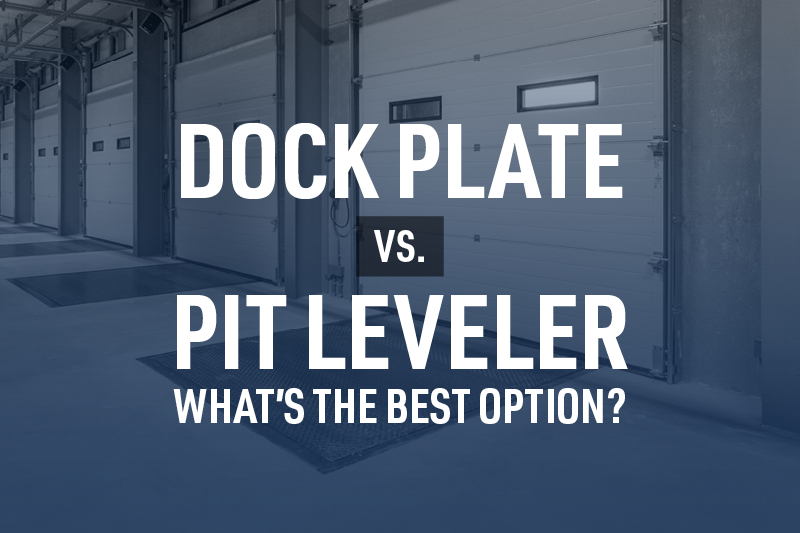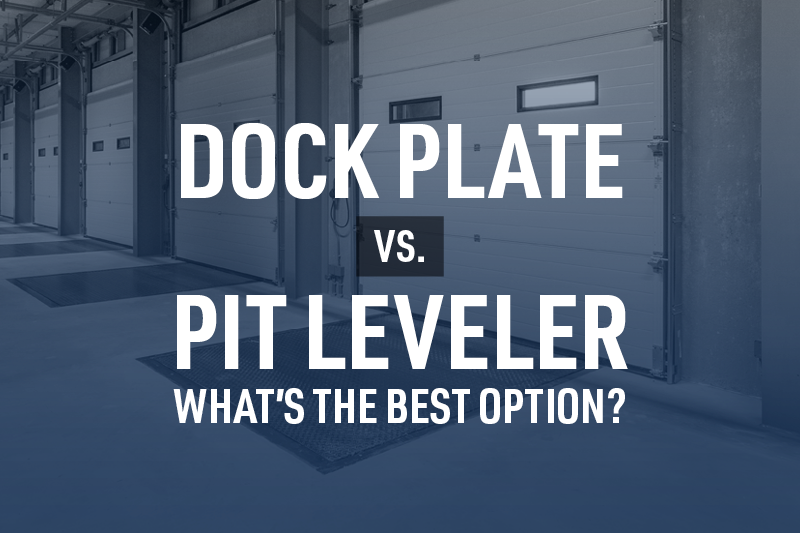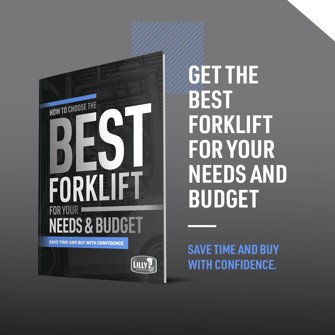3 min read
Dock Plate Vs. Pit Leveler — What’s The Best Option?
![]() Ken Lendermon
Feb 18, 2022 1:15:00 PM
Ken Lendermon
Feb 18, 2022 1:15:00 PM

 The gap between your loading dock and the back of a truck is one of the most dangerous areas in your workplace. Loading dock levelers (also known as pit levelers), dock plates and dock boards bridge that uneven gap.
The gap between your loading dock and the back of a truck is one of the most dangerous areas in your workplace. Loading dock levelers (also known as pit levelers), dock plates and dock boards bridge that uneven gap.
All three options provide a stable, secure platform for personnel to load and unload material, but the price points are very different. The best piece of equipment for your operation depends upon:
- How many trucks your team load or unloads
- If they use forklifts or other heavy equipment
- The weight of the load
Read on to quickly decide whether your operation can use a lightweight dock plate, a sturdy but portable dock board, or if you need to install a dock leveler (also known as a pit leveler). Want answers fast? Give us a call at 844-LILLYCO (1-844-545-5926) or contact us online.
Dock Levelers Vs. Dock Plates and Dock Boards
The number one thing that distinguishes a dock leveler from the other two options is portability.
- Dock levelers and edge-of-docks are permanently attached to the dock face
- Dock plates and dock boards can be picked up and moved
What’s the difference between a dock plate and a dock board?
There are two main differences. The first is construction and capacity:
- Dock plates are the more lightweight option. They’re generally made from aluminium and designed to be used with lighter loads moved via dolly or pallet jack.
- Dock boards are typically made out of steel and can be used with forklifts and other powered equipment.
The other big difference between dock plates and dock boards is a simple (but significant) safety feature. Dock boards have a curb at each edge to prevent run-off. On dock plates, there’s just a yellow stripe.
Different Types of Pit Levelers
Dock levelers, sometimes called pit levelers, are permanently mounted to the dock face. When a truck arrives, the dock leveler lip extends, creating a bridge between your loading dock and the trailer.
The lip can be extended manually or with the assistance of hydraulics or compressed air. Dock levelers can also be integrated with safety and communication devices to prevent the truck from pulling away from the dock prematurely and causing a serious, often tragic incident.
The most popular type of dock leveler is a hydraulic dock leveler. To activate, the operator simply pushes a button and lets the electric pump do the work of extending or retracting the lip.
Mechanical dock levelers are operated by pulling a chain to release the platform and raise the lip. They require a little more time and slightly more physical effort than a hydraulic leveler.
When to choose a mechanical vs. hydraulic dock leveler:
If you only have a few deliveries each day, a mechanical dock leveler may be the most cost-effective option. Mechanical dock levelers have a lower price point and cost a lot less to maintain compared to hydraulic levelers.
High-volume operations and applications that handle heavy loads will benefit from the strength and efficiency of a hydraulic or air-powered dock leveler.
When to choose an air-powered vs. hydraulic dock leveler:
Air-powered dock levelers have only been around about 20-25 years, so they’re not as common (yet). Their basic operation is similar to a hydraulic dock leveler. All the operator has to do is push a button to raise or lower the lip. An industrial-strength air bladder inflates or deflates until the lip reaches the desired position.
This “new” technology has the advantage of being cleaner (no leaky seals or connections to worry about) and they're generally less expensive. Air-powered dock levelers are also good for wet operations because they do not require electricity in the pit.
Get the Best Dock Leveler, Plate or Board for Your Operation
Our experienced and friendly loading dock experts can help you choose the right dock leveler, dock plate or dock board for your operational needs and budget. We’ll take the time to learn about your business first, then present you with personalized recommendations. We take pride in offering tailored solutions and helping our customers be more successful.
Give us a call at 844-LILLYCO (1-844-545-5926), contact us online, or come say hello at one of our 13 locations across the Mid-South. You’ll be glad you did.
Arkansas - Jonesboro
Alabama - Birmingham, Dothan, Irondale, Madison, Mobile, and Montgomery
Mississippi - Tupelo and Richland
Tennessee - Jackson, Kingsport, Knoxville, and Memphis
Further Reading:
Bollards, Guardrails and 3 Other Money-Saving Warehouse Products
How to Choose the Best Electric Pallet Jack
5 Simple Ways To Improve Loading Dock Safety & Efficiency
Posts by Tag
- Forklift (61)
- Forklift Service (19)
- Electric Forklifts (16)
- Forklift Safety (14)
- Forklift Attachments (12)
- Toyota Forklifts (12)
- Warehouse Planning (10)
- Parts (9)
- Warehouse Automation (8)
- Clark Forklifts (7)
- Loading Docks (7)
- Material Handling Education (7)
- Pallet Racking (7)
- Customer Solutions (6)
- Forklift Batteries (6)
- Forklift Rental (6)
- Purchasing Options (6)
- Aerial Equipment (5)
- Heavy Equipment (5)
- Forklift Accessories (4)
- Forklift Fleet Management (4)
- Forklift Tires (4)
- Forklift Training (4)
- Products (4)
- Utility Vehicles (4)
- Yard Spotter Trucks (4)
- Linde (3)
- Pallet Jacks (3)
- Specialty Forklifts (3)
- Used Equipment (3)
- IC Forklifts (2)
- Manitou (2)
- Warehouse Doors (2)
- COMBiLift (1)
- Custom Shop (1)
- Forklift Brakes (1)
- Forklift Warranty (1)
- Gehl (1)
- Komatsu (1)
- Product Review (1)
- Recruitment (1)











